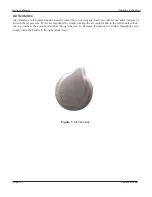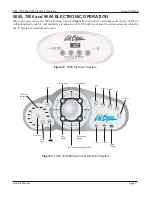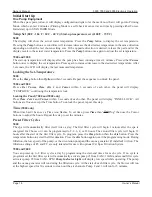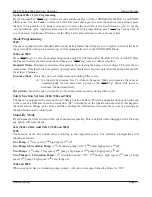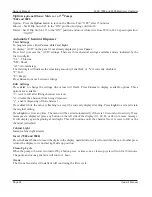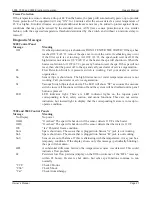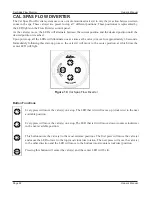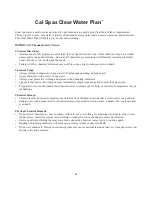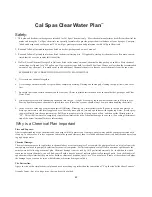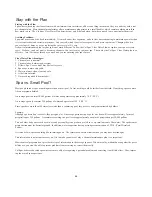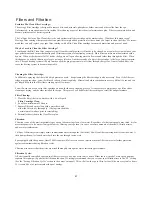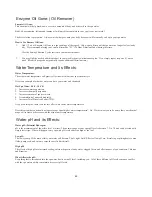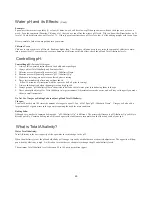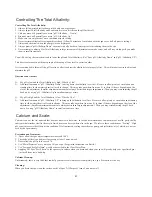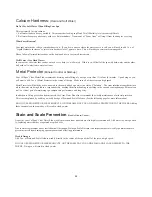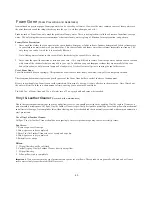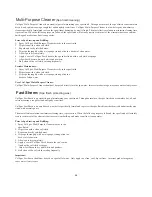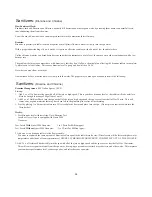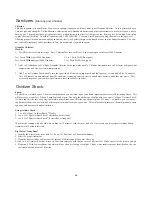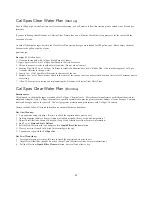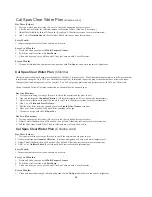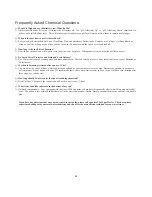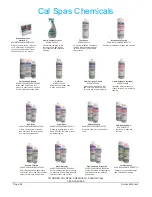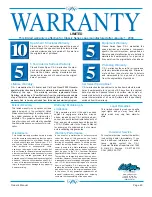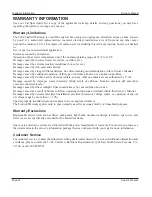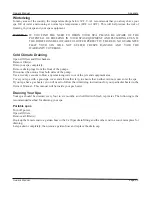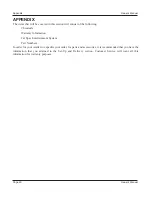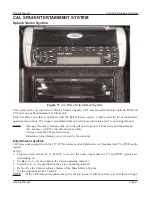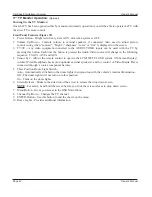
Controlling The Total Alkalinity:
Controlling The Total Alkalinity:
1. Always follow printed instructions on the bottle and/or packages.
2. Always adjust Total Alkalinity and Sanitizers first even if it throws the pH further off.
3. Chlorine users will generally use more “pH / Alkalinity
Down.”
4. Bromine users will generally use more “pH / Alkalinity Up.”
5. Make sure test strips are not wet or outdated prior to testing.
6. Never test immediately after using oxidizer shock. (Allow 30 minutes of circulation with the spa cover half off prior to testing.)
7. Always add chemicals when the pump(s) are on high speed.
8. Always premix “pH Alkalinity Down” chemicals in half a bucket of water prior to introducing them to the spa.
9. Never attempt to adjust pH or Total Alkalinity in large increments. Adjustments are made easier, and will stay set longer if you make
them in small increments.
You will be using the same chemicals to lower the pH and Total Alkalinity. (Cal “Spas pH / Alkalinity Down” and “pH / Alkalinity UP.”)
This does create concern with some people of throwing off one level to correct another.
It is recommended to throw off the pH level in an effort to adjust the alkalinity level properly first. This will make it easier to adjust and
maintain the pH.
Questions and Answers
Q: My pH is low and the Total Alkalinity is high. What do I do?
A: Add small amounts of “pH / Alkalinity Down” to bring down the alkalinity level first. Be sure to allow plenty of circulation and
standing time for the waters chemical levels to change. This may take anywhere from one (1) to three (3) hours depending on the
size of the adjustment. (Smaller adjustment amounts are always better than larger adjustments.) Then you may start adjusting the pH
back up, by using “pH / Alkalinity Up”in small amounts at a time.
Q: My pH is high and the Total Alkalinity is low. What do I do?
A: Add small amounts of “pH / Alkalinity UP” to bring up the alkalinity level first. Be sure to allow plenty of circulation and standing
time for the waters chemical levels to change. This may take anywhere from one (1) to three (3) hours depending on the size of the
adjustment. (Smaller adjustment amounts are always better than larger adjustments.) Then you may start adjusting the pH back
down by using “pH / Alkalinity Down” in small amounts at a time.
Calcium and Scale:
Calcium is one of the few minerals that does not dissolve in hot water. In fact, hotter water makes calcium more of a solid, gritty, chalky
substance that attaches itself to the acrylic finish, heater, and everywhere else in the spa. We refer to these conditions as “Scaling”. High
pH can also increase the effects of this condition. If left untreated, scaling causes heater, pump, and jet failures; all, of which, are not cov-
ered by the spa warranty.
Prevention and Treatment:
1. Never allow the spas water temperature to exceed 104˚F.
2. Check the pH levels and adjust if necessary at least 3 times a week.
3. Never allow the pH level to exceed 7.8.
4. Use “Metal Protector” every time you fill your spa. (See printed instructions on Bottle.)
5. Use “Stain and Scale Defense” weekly as described in the Clear Water Plan.
6. Applying Cal Spas “Fast Sheen” to the spas acrylic surface when you drain and clean your spa will greatly help your spas finish pro-
tect itself from scale build-up.
Calcium Clean-up:
Unfortunately, there is very little that can help you remove calcium or scale completely in a spa. Prevention is the key.
Cleaning:
When you drain the spa, clean the surface with Cal Spas “All Purpose Cleaner” and rinse well.
51
Summary of Contents for Pneumatic Series
Page 12: ...10...
Page 78: ...10...
Page 118: ...10...
Page 161: ...Owner s Manual Page 11 Electrical Installation Owner s Manual Figure 3 GFCI Hook Up...
Page 219: ...Owner s Manual Page 11 Electrical Installation Owner s Manual Figure 3 GFCI Hook Up...
Page 282: ...Owner s Manual Page 11 Electrical Installation Owner s Manual Figure 3 GFCI Hook Up...

